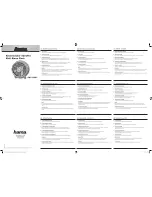
The JA-151ST Wireless combined smoke and heat detector
The JA-151ST Wireless combined smoke and heat detector
2 / 2
MLW55806
4.
Proceed according to the control panel installation manual
.
Basic procedure:
a. There must be the JA-110R radio module enrolled in the
system.
b.
Go to the
F-Link
program, select the required position in the
Devices
window and launch enrollment mode by clicking on
the Enroll option.
c. When you insert all batteries into the detector, an enrollment
code is sent to the system – its sending is confirmed with a
short flash of the LED indicator (3).
Note:
The detector can also be enrolled into the system by
entering its serial number (5) in the F-Link program or using a bar
code scanner). All numbers stated under the bar code shall be
entered (1400-00-0000-0001).
5.
Insert the detector into the plastic base.
The detector can be
inserted into the plastic base in one position only. It is marked
with
arrows
(4) on both plastic parts. Close the detector cover
by turning it clockwise (2).
Note:
Detector cover closing is blocked unless all 3 batteries
are inserted!
The mounting base must not be replaced by bases meant for
detectors without the test button consisting of pressing the
body of the detector.
Detector setting
The detector properties can be set in the
Devices
window in the
F-Link
program or with configuration terminals.
The
Reaction
option in the
Devices
window allows you to set the
type of reaction of the system to the activation of the enrolled
detector. The configuration terminals on the detector PCB
determine other reactions:
SIR
enables deactivating the built-in siren.
MEM
alarm memory signalling – if enabled, the detector LED
remains active for an additional 24 hours Signalling can also be
terminated by pressing the detector body against the base.
SMOKE and TEMP
combination of these terminals defines
whether the detector will react to smoke and heat.
Fire alarm
A fire alarm
is signalled acoustically and optically according to
the settings.
When the conditions for fire alarm triggering are met (smoke is
detected in the room, the alarm temperature is reached, or both
conditions are met), the detector signals the danger by sounding
the siren and quick flashing of the LED indicator (3). The alarm
information is concurrently sent to the system control panel.
Silencing the siren during an alarm:
The siren can be silenced
by pressing the detector body against the base. The siren is
inactive for 10 minutes. If the detector still detects smoke or heat
then, the siren is activated again.
When the need arises (e.g. in the case of detector failure), it is
possible to postpone siren reactivation by up to 12 hours. This can
be done by pressing the detector again for 5 s after silencing the
siren. When the detector chirps, you have to release the pressure
within 1 s. The switchover to postponed siren mode is confirmed
with 5 chirps. The detector LED flashes all the time during the
postponement.
Alarm memory:
If it is enabled, LED indication continues even
when the smoke clears or when the temperature decreases. The
slow-flashing indication lasts 24 hours unless it is terminated by
pressing the detector body.
Tamper alarm:
When the detector cover is opened, the detector
sends a tamper signal to the control panel.
Detector testing and maintenance
The detector should be tested at least once per month.
To
test the detector press the detector against the base and wait until
an LED indicator switches on. The LED flashing signals switchover
to the test mode. The LED is flashes for the whole duration of the
test. When the test is complete, the LED switches off. The detector
then signals the result. If the detector beeps once, the test has been
done successfully. If a failure is discovered, the LED flashes and
beeps three times. If the battery is low, there is no acoustic
signalling but just one flash when the test is completed.
The complete functioning of the optical part of the detector can be
tested with a test spray (e.g. SD-TESTER). The heat sensor can be
tested with heated air (e.g. with a hair dryer).
If the control panel is not in SERVICE mode, a fire alarm is
triggered.
Warning: never test the detector with fire.
Fault indication
The detector checks its functioning. If it discovers a fault, it chirps and
flashes the LED three times and then flashes briefly three times every 30 s.
A detector test can be carried out when a fault is signalled. To test the
detector, press its whole body against the base. During the test the
detector checks whether there is still a fault. The red LED flashes during
the test. When the test is completed, the LED stops flashing and the
detector then signals the result. A persistent fault is signalled by 3 flashes
and 3 beeps. If the fault has been fixed, the detector chirps briefly.
If you have not managed to fix the fault, the detector must be sent to
a service centre.
Battery replacement
The detector checks the battery status and if the batteries are
running low, the detector signals that they need replacing by short
flashes repeated every 30 s. The information is also sent to the
control panel. Replace the batteries as soon as possible.
Exchange procedure:
-
If the detector is already enrolled to the system it’s
necessary to enter service mode
-
open the detector
-
remove the old batteries
-
press and hold the test button (8) until the LED (3) goes ON
-
when the LED goes OFF , it shows the capacitors inside the
detector have been discharged
-
insert some new batteries
Always replace all three batteries with the same type and
manufacturer.
Use only high-quality 1.5 V AA alkaline batteries.
Do not throw used batteries into ordinary household waste.
Deposit them at authorized collection points.
Removal of the detector from the system
The system reports any possible detector loss. If you
have removed it on purpose, you also have to erase it from the
corresponding address in the control panel memory.
Technical specifications
Power
3 x Alkaline battery type LR6 (AA) 1.5 V / 2.4 Ah
Please note: Batteries are not included
Typical lifetime
approx. 3 years
Smoke detection
optical light scattering
Smoke detector sensitivity
m = 0.11 - 0.13 dB/m
pursuant to EN 14604:2005, EN 54-7
Heat detection
class A1 according to EN 54-5
Alarm temperature
+ 60 °C to +65 °C
Communication band
868.1 MHz, Jablotron protocol
Communication range
approx. 300 m (unrestricted area)
Dimensions
diameter 126 mm, height 50 mm
Weight
150 g
Operating temperature range
-10 °C to +65 °C
Also complies with
EN 54-25,
ETSI EN 300 220, EN 60950-1, EN 50130-4 and EN 55022.
Can be operated according to
ERC REC 70-03
14
1293-CPR-0391
1293
JABLOTRON ALARMS a.s. hereby declares that the JA-151ST
is in a compliance with the relevant Union harmonisation legislation:
Directives No: 2014/53/EU, 2014/35/EU, 2014/30/EU, 2011/65/EU.
The original of the conformity assessment can be found
at www.jablotron.com - Section Downloads.
Note:
Although this product does not contain any harmful
materials we suggest you return the product to the dealer or
directly to the producer after use.




















